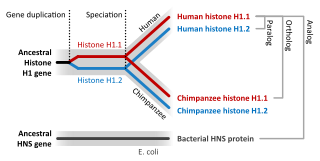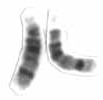Related Research Articles

Sequence homology is the biological homology between DNA, RNA, or protein sequences, defined in terms of shared ancestry in the evolutionary history of life. Two segments of DNA can have shared ancestry because of three phenomena: either a speciation event (orthologs), or a duplication event (paralogs), or else a horizontal gene transfer event (xenologs).

Chromosome 10 is one of the 23 pairs of chromosomes in humans. People normally have two copies of this chromosome. Chromosome 10 spans about 134 million base pairs and represents between 4 and 4.5 percent of the total DNA in cells.

Chromosome 14 is one of the 23 pairs of chromosomes in humans. People normally have two copies of this chromosome. Chromosome 14 spans about 101 million base pairs and represents between 3 and 3.5% of the total DNA in cells.

Leukocyte antigen CD37 is a protein that in humans is encoded by the CD37 gene.

Lysosome-associated membrane protein 2 (LAMP2), also known as CD107b and Mac-3, is a human gene. Its protein, LAMP2, is one of the lysosome-associated membrane glycoproteins.

Rh-associated glycoprotein (RHAG) is an ammonia transporter protein that in humans is encoded by the RHAG gene. RHAG has also recently been designated CD241. Mutations in the RHAG gene can cause stomatocytosis.

Rh family, C glycoprotein, also known as RHCG, is a protein that in humans is encoded by the RHCG gene.

Rh family, B glycoprotein, also known as RHBG, is an ammonia transporter protein which in humans is encoded by the RHBG gene.

Protein FAM3C is a protein that in humans is encoded by the FAM3C gene.

Protein FAM60A is a protein that in humans is encoded by the FAM60A gene. The expression of FAM60A gene is higher in KRAS mutant non-small cell lung cancer.

Protein FAM3B is a protein that in humans is encoded by the FAM3B gene.

Family with sequence similarity 49, member A, also known as FAM49A, is a protein which in humans is encoded by the FAM49A gene.

Family with sequence similarity 20, member C also known as FAM20C or DMP4 is a protein which in humans is encoded by the FAM20C gene. Fam20C, a Golgi localized protein kinase, is a serine kinase that phosphorylates both casein and other highly acidic proteins and members of the small integrin-binding ligand, the N-linked glycoproteins (SIBLING) family at the target motif SerXGlu.

Y+L amino acid transporter 2, also known as cationic amino acid transporter, y+ system, is a protein that in humans is encoded by the SLC7A6 gene.

Nuclear factor -like factor 3, also known as NFE2L3 or 'NRF3', is a transcription factor that in humans is encoded by the Nfe2l3 gene.

Protein FAM83A also known as tumor antigen BJ-TSA-9 is a protein that in humans is encoded by the FAM83A gene.

Family with sequence similarity 167, member A is a protein in humans that is encoded by the FAM167A gene located on chromosome 8. FAM167A and its paralogs are protein encoding genes containing the conserved domain DUF3259, a protein of unknown function. FAM167A has many orthologs in which the domain of unknown function is highly conserved.

Family with sequence similarity 98, member A, or FAM98A, is a gene that in the human genome encodes the FAM98A protein. FAM98A has two paralogs in humans, FAM98B and FAM98C. All three are characterized by DUF2465, a conserved domain shown to bind to RNA. FAM98A is also characterized by a glycine-rich C-terminal domain. FAM98A also has homologs in vertebrates and invertebrates and has distant homologs in choanoflagellates and green algae.

Family with sequence similarity 19 member A4, C-C motif chemokine like is a protein that in humans is encoded by the FAM19A4 gene.

Family with sequence similarity 84 member B is a protein that in humans is encoded by the FAM84B gene.
References
- ↑ "Entrez Gene: Family with sequence similarity 3, member D" . Retrieved 2014-03-09.